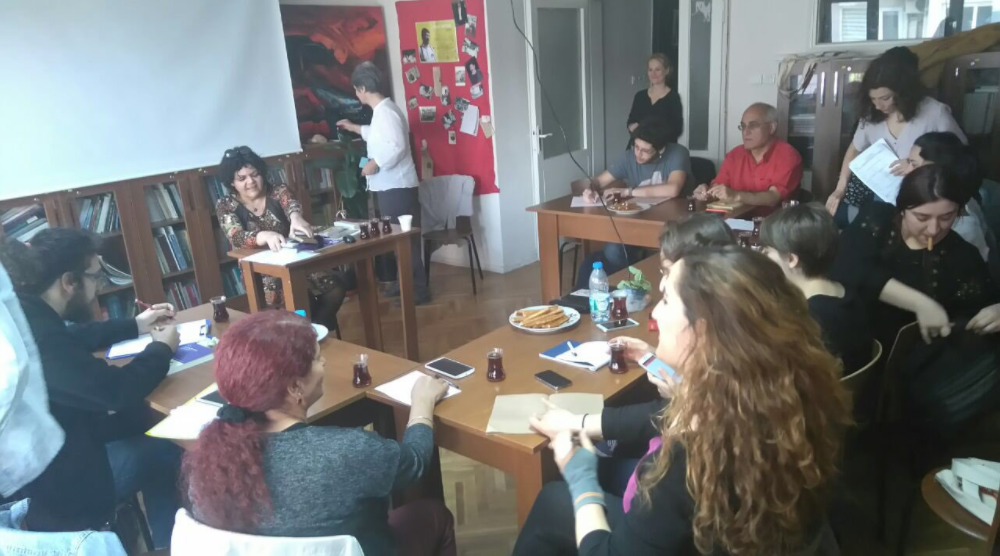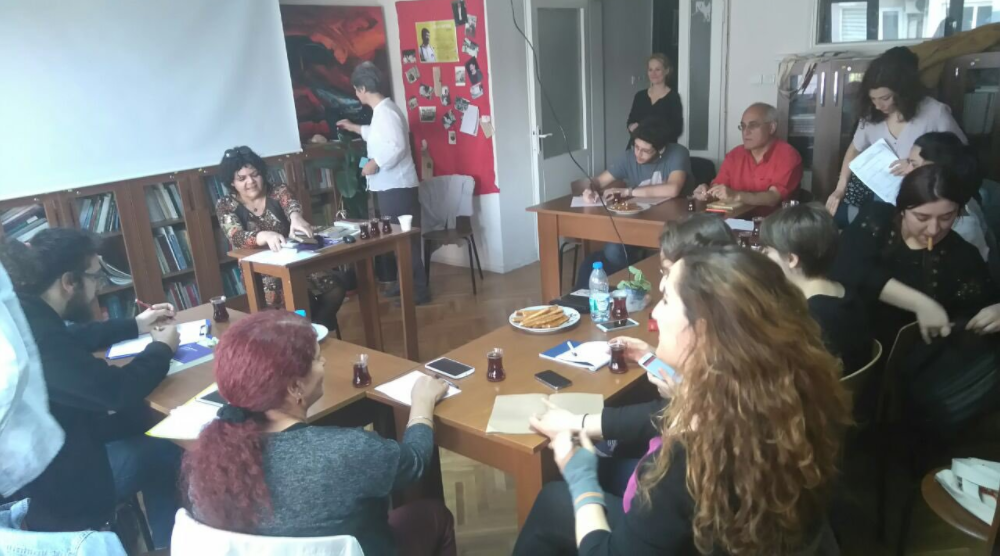‘Sexism’ as a barrier to women employment

Interview: Emine Uçak, 10 January 2018 Initiative for Haq Istanbul held a conference titled “Women’s Rights and Women’s Labor in Turkey” with the participation of Zelal Ayman from Women for Women’s Human Rights-New Ways and Gülnur Elçik from Women’s Labor and Employment Initiative Platform. The main idea behind the event was that it is only […]
Interview: Emine Uçak, 10 January 2018
Initiative for Haq Istanbul held a conference titled “Women’s Rights and Women’s Labor in Turkey” with the participation of Zelal Ayman from Women for Women’s Human Rights-New Ways and Gülnur Elçik from Women’s Labor and Employment Initiative Platform. The main idea behind the event was that it is only possible for women to exist in the social and political arena equally when “women’s human rights” are on the front burner.
Gülnur Elçik, “The biggest issue regarding women employment is sexism of the labor market,” said in her speech.
Zeynep Uçar from Istanbul Think-House was the moderator of the Conference. Zelal Ayman from Women for Women’s Right-New Ways, who was the first speaker in the conference, stated that her organization is the first institutionalized association among the other women’s organizations established in the 1990s. After stating that they are active in many fields, she said that there are three issues that must be considered at top: Raising awareness about women’s constitutional rights, extending the knowledge on feminism by advocacy and reproducing the feminist knowledge through networking. According to Uçar, although these issues were very important in the ‘90s, they still maintain their importance today. “Achievements on women’s right are mostly thanks to the women organizations and sustainability is the key in this,” she indicated. “CEDAW (The Convention on the Elimination of All forms of Discrimination against Women) and the Istanbul Convention (Council of Europe Convention on Preventing and Combating Violence against Women and Domestic Violence) are very important agreements and they were all achieved thanks to women’s struggles. However; we can see that the signatory countries cannot take required measures to prevent discrimination and violence. These conventions are insufficient when it comes to enforcement. In spite of the globalization, there is still not a global mechanism to prevent violence and discrimination against women. All these efforts are of course very important, but unfortunately not sufficient today. “Women and men are not equal” discourse is affecting the women’s movement’s achievements negatively. As women and men believing in equality, we must continue our efforts. Particularly, we must get together with local women. We would lose a lot if we lose contact with them,” Ayman remarked in her speech.
Gülnur Elçik from Women’s Labor and Employment Initiative referred the survey report published by Rights Initiative titled “Observation Report on the Violation of Rights in the Shoe Industry” and pointed out the importance of exposing any kind of exploitation, especially in times of oppression.
According to her, the discourse on women’s rights is not that important and assertive in the way it was in the old struggle terms, and the different structures to bring down the achievements of women by using the women’s right discourse has not come into existence yet. “That’s why; it is more important to evaluate those achievements qualitatively, particularly when it comes to women employment,” Elçik indicated. “Almost every employee faces many problems regarding the employment area, but systems like flexible employment is a much bigger problem for women’s employment”, she said. “Child care stands as a huge obstacle for women employment in a global scope. Other countries try to solve this issue with a regard to gender equality, however; the state of Turkey encourages working women to have children instead of providing employment for the women with children,” she explained.
“Flexible employment is used as a tool to increase fertility. We are not saying women to stop giving birth. However; it is a massive problem to ignore their many other potentials and encourage them to breed as if it is their only option for the future. Child care in Turkey is seen as a life-long occupation for women. This belief passes from mother to child and from child to her children. Women indeed need more nurseries in order to be ‘good mothers’. The number of public nurseries was above 580 back in 2007, but today there are only 56 of them. The closure of nurseries is not the only problem. Child care is not publicized and transferring money to grandmothers is enabled as an election strategy. Variation and publicization of child care servies is the most important the the most important issue to talk regarding the women employment in Turkey. Also, the expression of ‘women are under-qualified’ is another problem and it is a reflection of sexism around the world. The biggest issue regarding women employment is the sexism of the government and the labor market in Turkey. It is government’s statements that trivialize the women labor,” she concluded her speech.



Bizi Takip Edin